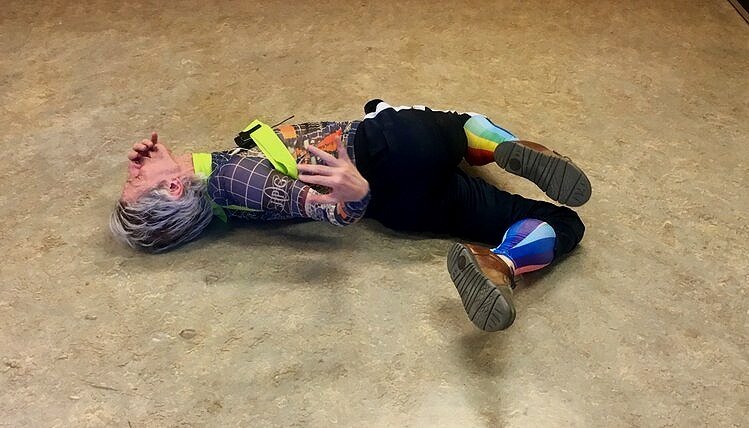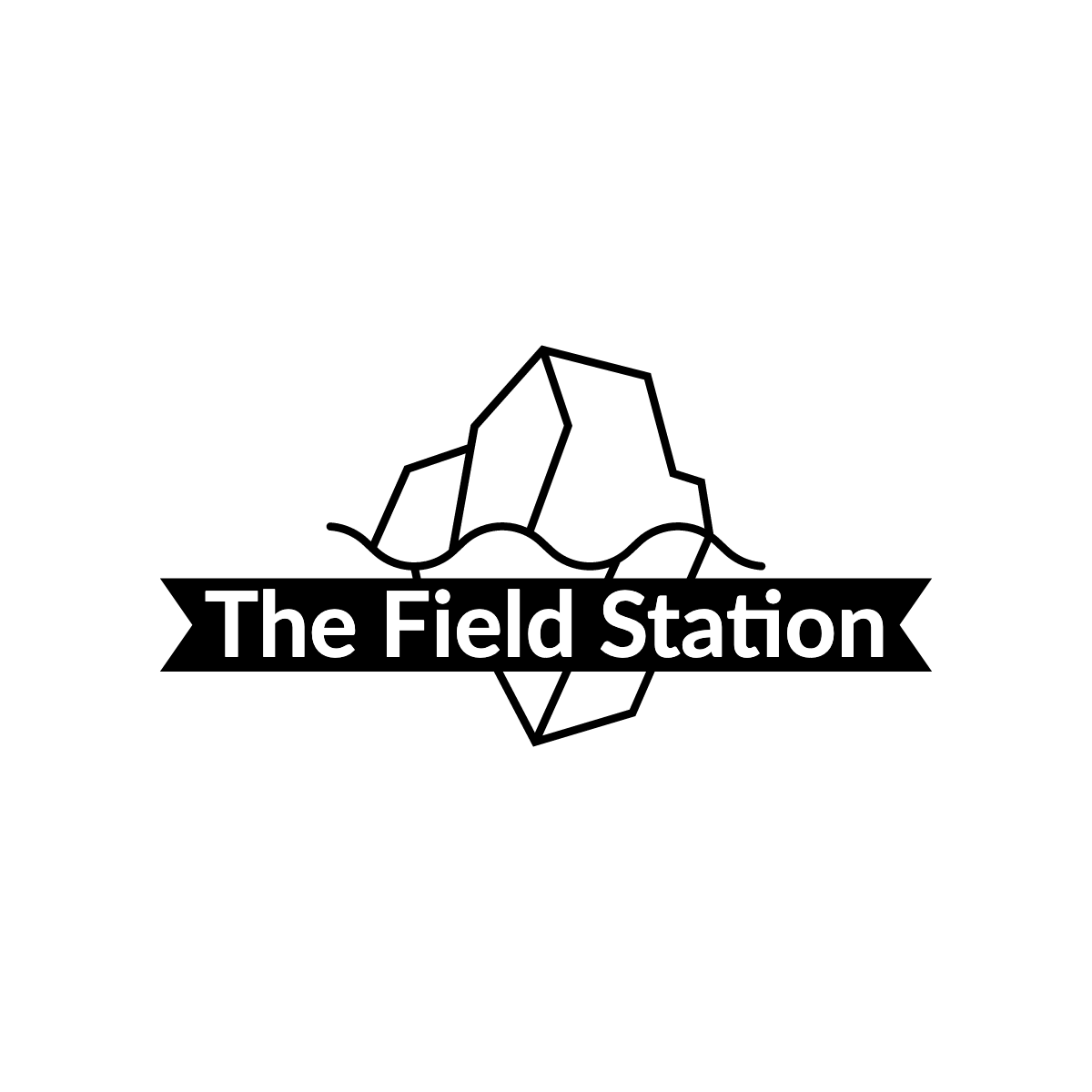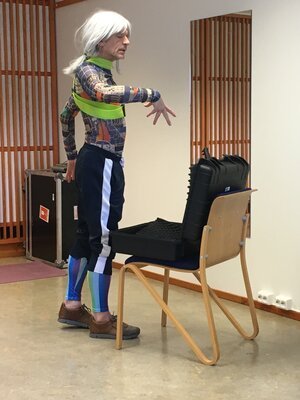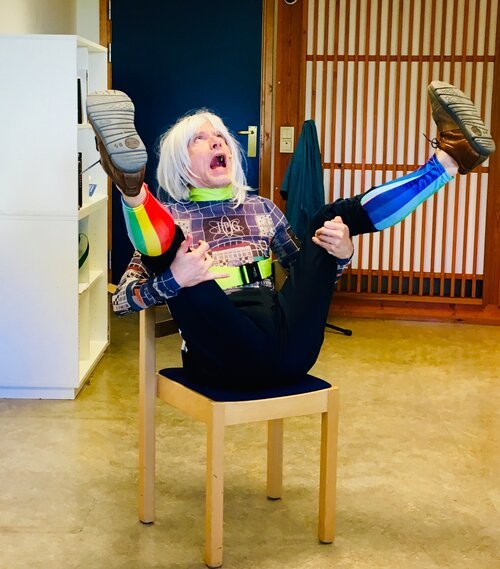
Loretta Strong
LORETTA STRONG - A QUEER SPACE OPERA
The product of one of the most talked-about dramatists in the French Language, Loretta Strong continues to shock and challenge all who come into contact with it, questioning the performance of gender, defying normative representation and confronting the realities of being marginalised - where we all desire to speak, to be heard and to communicate, even lost in space.
A 2 week development workshop was held at The Field Station in July 2021
Set on the borderline of reality and delirium and imbued with Copi’s trademark racy wit and manic pace, Loretta Strong opens up radical new insights into the queer experience and provokes conversations around generational queer identity and the legacy of our LGBTQ+ elders.
Working in collaboration with Britain’s Royal Shakespeare Company and the University of Portsmouth’s Centre for Creative and Immersive XR, (CCIXR), we will combine the long-held theatrical crafts of detailed text work, oration, acting, movement, direction, sound and music with immersive digital technologies to fully realise the extraordinary and surreal poetic imagery of Copi’s Loretta Strong.
Watch this space.
A commandingly bizarre space opera, Loretta leaves a distraught planet Earth in search of an alternative place to live where she can plant and harvest gold. A delirious monologue that traces Loretta's queer odyssey through a series of one-sided, continuous telephone conversations with numerous people, animals and aliens on and off her spaceship, exposing the audience to her self-induced, profit-oriented isolation. Loretta is immersed in the incoherence and miscommunication of her cosmic exile. Her circumstances force her to speak from the margins in the strange poetics of ‘otherness’. Unable and unwilling to follow traditional narratives, Loretta Strong explodes outward into a queer space of her own, abandoning all form and logic.
The Augmented Reality of Copi's Loretta Strong - Director Oliver Dawe on adapting and developing the seminal queer monologue.
I started exploring this project two years ago with two long-term collaborators: Composer Josh Spear and Performer François Testory as a cross-discipline experimentation in combining narrative-led drama with new music composition. During an initial 10-day R&D period in Oslo, Norway in September 2019, we explored our approaches to the text and experimented with ideas for music and sound design. There we struck upon an exciting discovery: Loretta Strong is an expression of the inner workings of the queer mind. Her epic space odyssey dramatises how many queer people re-imagine a reality for themselves, away from pain, oppression and shame; where they can be who they truly are. Loretta Strong is the first in a long line of queer superheroes. In other words, it is a projected fantasy and what better dramaturgical tool than Augmented Reality with which to tell this story.
Having never worked with AR, I began researching the technology. Through exploring how to implement it in performance, I unearthed some core aesthetic concerns. The key findings were:
- For Music Theorist Paul Craenen, a theatrical body is one that refers to two worlds (at least) and acts as a projection field; a presence which is ambiguous by nature. With AR (augmented reality) there is the opportunity to turn the entire performance space into such a projection field.
- Theatre Writer Josephine Machon notes that within Gaming theory, immersion and presence are quite interchangeable words: “In digital disciplines ‘immersive’ is used as an adjective to describe those computer displays or systems that generate a three-dimensional image that appears to surround the user. It is also understood more generally as pertaining to digital technology or images that deeply involve one’s sense and/or may create an altered mental state.”
- Because of the co-presence of the audience and actor, performance in AR is still a performance. Erika Fischer-Lichte’s “autopoietic loop”, that is the feedback loop between audience and performer, remains intact. The autopoietic system is in some way an energy flow between those producing and receiving that enables a highly contingent and “fundamentally open, unpredictable process”.
In such an AR performance of Loretta Strong, the audience would use a headset/apparatus to watch Francois perform in a stage space. The headset then overlays the projected and imagined intergalactic world of Loretta on top. In this way, impossible images and larger illustrative gestures combined with sound are made possible, presenting the duality inherent in text/the play. Our dramaturgy uses everyday objects and appliances from the characters reality and imbues them with a supernatural other life and function aboard a Spaceship, paralleling our protagonist’s queer projected fantasies.
The potential of using 3D-modelling within AR is enormously exciting and helps to further the exploration of this idea. In a similar way, there is the potential to digitally transform the protagonist from an older man into his avatar through motion capture. Again, the performance possibilities are vast here and are very much following the need for our form to reflect the content.
Through a kind of Digital Drag, the character of Loretta becomes embodied as the queer intergalactic superhero that she is and her fantastical extended reality is finally made visible to an audience.
Working in collaboration with Britain’s Royal Shakespeare Company and the University of Portsmouth’s Centre for Creative and Immersive XR we will combine the long-held theatrical crafts of detailed text work, oration, acting, movement, direction, sound and music with immersive digital technologies to fully realise the extraordinary and surreal poetic imagery of Copi’s Loretta Strong.
Old and new creative practices will meld seamlessly together to make Francois appear to fly into a black hole, traverse low-gravity alien worlds, give birth to cannibalistic rats and even explode into cosmic dust and then reassemble before the audience's very eyes.
Digital augmentation technologies open up a wide range of performance possibilities beyond traditional arts spaces. The creation of digital environments, sets, costumes, props and even other performers does away with the limits of physical performance spaces and makes it an extremely agile, flexible and adaptive form, increasing access to the arts outside of traditional points of entry. It also makes it an environmentally sustainable option. In the not too distant future, I would like to tour a final version of the adaptation and really push the boundaries of where and how new digital technology performances can be experienced by audiences.
Oliver Dawe - 2021




